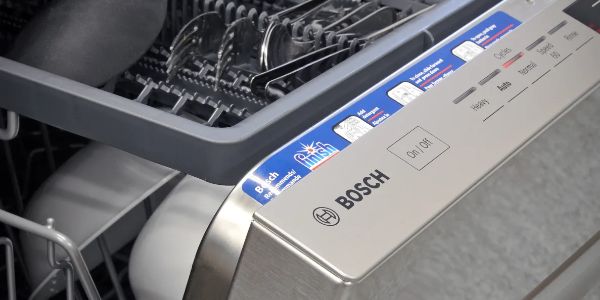When it comes to high-quality appliances, Bosch has been a trusted name in the industry for decades. With a reputation for innovation, reliability, and performance, Bosch dishwashers have become a popular choice for households worldwide. Two prominent series from Bosch, the 300 and 800, offer a range of features and functionalities that cater to various needs.
Here we’ll explore the key differences between the Bosch 300 and 800 dishwashers, helping you make an informed decision about which model is the right fit for your home.
Table of Contents
Design and Build Quality
Both the Bosch 300 and 800 dishwashers share a sleek and modern design, featuring stainless steel finishes and a user-friendly control panel. However, the Bosch 800 series typically offers a more premium feel with its refined aesthetics and additional customization options, such as a bar handle design. While the 300 series boasts a solid build quality, the 800 series takes it up a notch, showcasing enhanced craftsmanship and attention to detail.
Performance and Noise Level
When it comes to performance, both the Bosch 300 and 800 series dishwashers deliver exceptional results. They feature advanced washing systems that ensure efficient cleaning, while adjustable racks and flexible loading options make it easier to accommodate different dishware sizes and shapes.
Where the Bosch 800 series truly shines is in its noise reduction capabilities. Equipped with Bosch’s advanced insulation and innovative technologies, these dishwashers operate at whisper-quiet noise levels, typically around 40-44 decibels. On the other hand, the Bosch 300 series performs admirably but may emit slightly more noise during operation, ranging between 46-50 decibels. Consider your preference for a quiet environment when deciding between the two.
Cycle Options and Advanced Features
Both the Bosch 300 and 800 series offer a variety of cycle options to suit your specific needs. From quick washes for lightly soiled dishes to intensive cycles for tough stains, you’ll find a range of choices in both series. However, the Bosch 800 series tends to provide more advanced features and customization options.
The Bosch 800 series often includes specialized cycles like the AutoAir dry option, which opens the dishwasher door slightly at the end of the cycle to accelerate drying. It also offers features like the MyWay third rack, providing additional space for utensils and small items. While the 300 series may lack some of these premium features, it still offers a comprehensive set of cycle options suitable for most households.
Energy Efficiency and Sustainability
Both the Bosch 300 and 800 series dishwashers prioritize energy efficiency and sustainability. They are ENERGY STAR certified, ensuring they meet strict energy efficiency standards. These dishwashers incorporate technologies like Bosch’s EcoSilence motor, which not only reduces energy consumption but also minimizes noise levels.
Additionally, both series employ a load sensor system that optimizes water usage based on the amount of dishes being washed, reducing water waste. By choosing either the Bosch 300 or 800 series, you can make an eco-friendly choice without compromising on performance.
Price and Value
The price range for Bosch dishwashers can vary depending on the specific model and its features. Generally, the Bosch 800 series tends to be pricier compared to the 300 series, primarily due to its advanced features and premium design. However, both series offer excellent value for money, as you can expect long-term durability, exceptional cleaning results, and energy efficiency from either choice.
Conclusion
In the Bosch 300 vs 800 comparison, both series demonstrate Bosch’s commitment to delivering reliable and high-performing dishwashers. The Bosch 800 series stands out with its superior noise reduction, advanced features and customizable options, and refined aesthetics. On the other hand, the Bosch 300 series offers solid performance, durability, and a more affordable price point.
Ultimately, the choice between the Bosch 300 and 800 series comes down to your specific preferences, budget, and the level of customization and advanced features you desire. If you prioritize a quieter operation, specialized cycles, and a premium look, the Bosch 800 series is the way to go. However, if you’re looking for a reliable dishwasher with solid performance and a more budget-friendly option, the Bosch 300 series will serve you well.
Before making a purchase, consider your household’s dishwashing needs, the available space in your kitchen, and any specific features that are important to you. It’s also helpful to read customer reviews and compare specifications to ensure you select the perfect dishwasher that meets your requirements.
Whichever series you choose, both the Bosch 300 and 800 models are backed by Bosch’s reputation for quality and reliability. Investing in a Bosch dishwasher guarantees you a long-lasting, efficient, and eco-friendly appliance that will make your daily dishwashing tasks a breeze.
In conclusion, the Bosch 300 vs 800 debate boils down to your individual needs and preferences. Whether you opt for the more affordable and reliable Bosch 300 series or the advanced features and premium feel of the Bosch 800 series, you can rest assured that you’re investing in a high-quality dishwasher that will enhance your kitchen experience for years to come.

